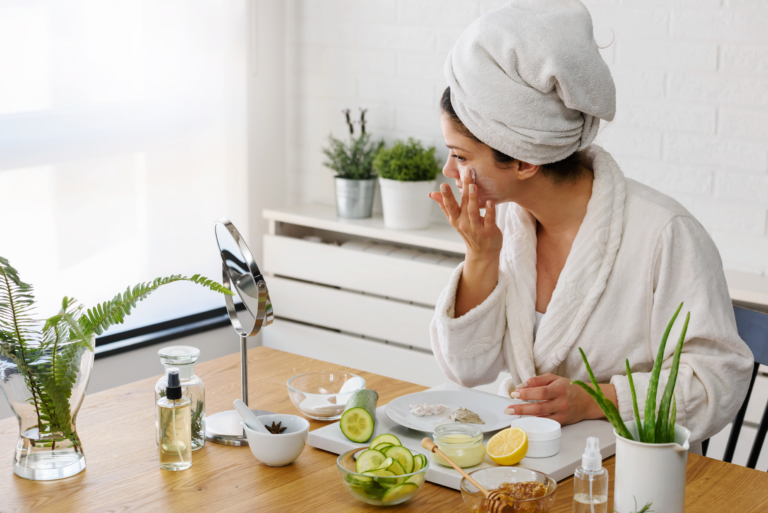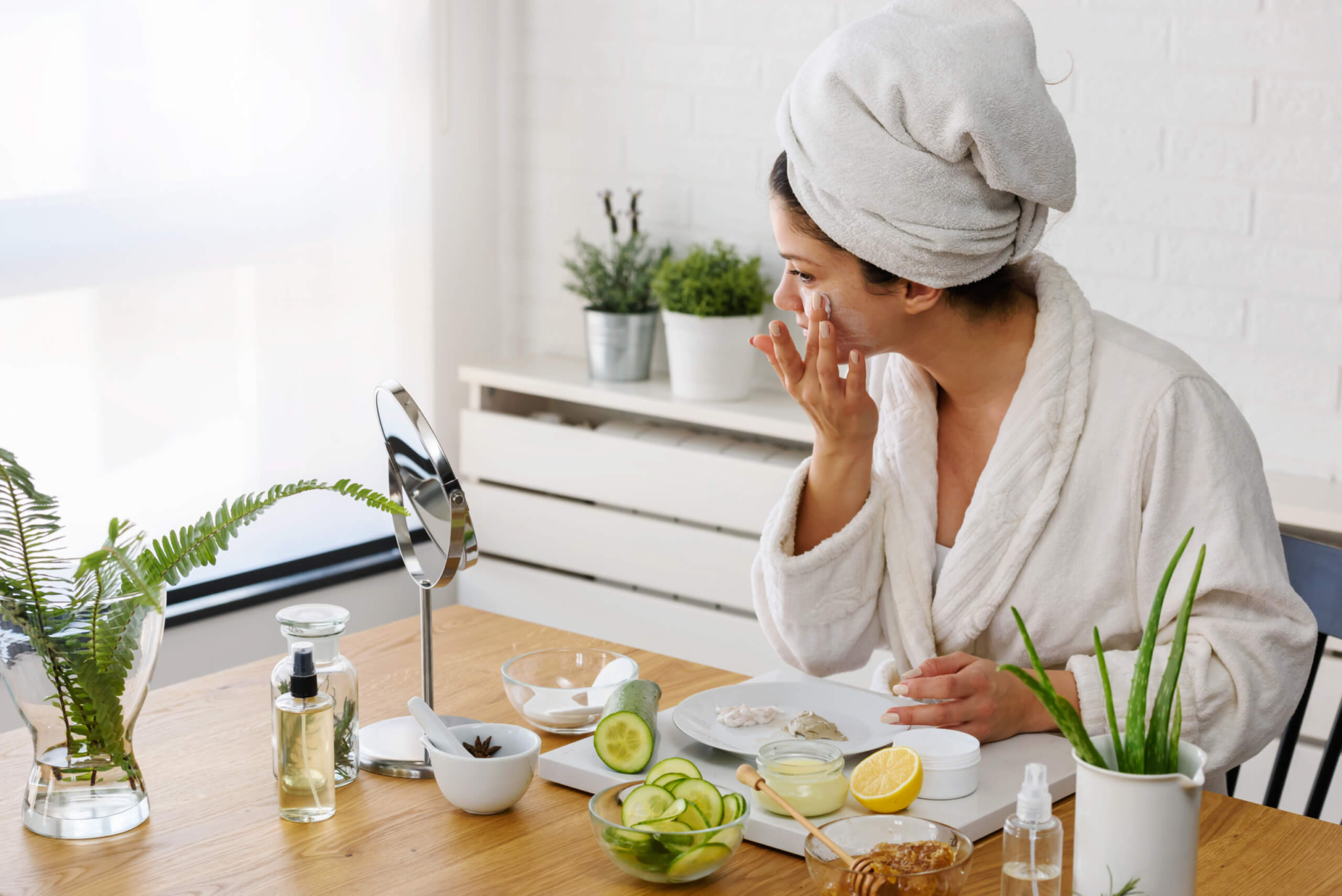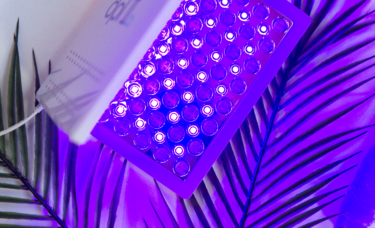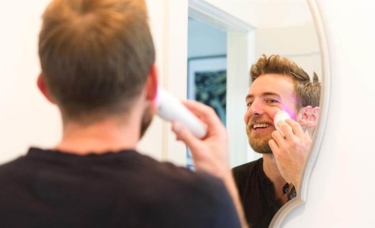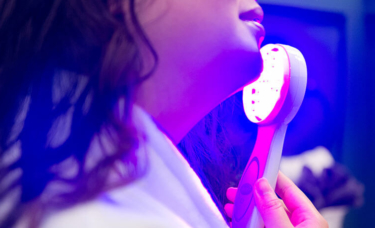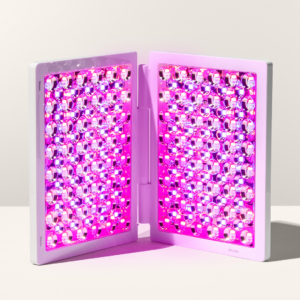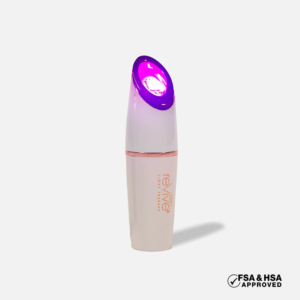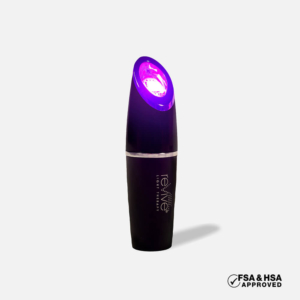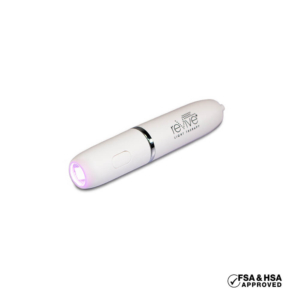DIY Ways to Reduce Acne
There are a lot of acne treatments, formulas, and DIY acne remedies out there. It can be a challenge to find just the right approach for your particular acne issues.
So we did the homework for you to highlight some of the best and most common at-home acne remedies out there.
If you’re trying to avoid harsh chemicals or just looking for ways to enhance your anti-acne regimen, you’re bound to find some great ideas for DIY acne remedies.
And remember, blue light therapy can be one more arrow in your acne-fighting quiver. All-natural, non-invasive, and drug-free, blue light therapy can be added to almost any non-Accutane anti-acne regimen with no fear of negative interactions.
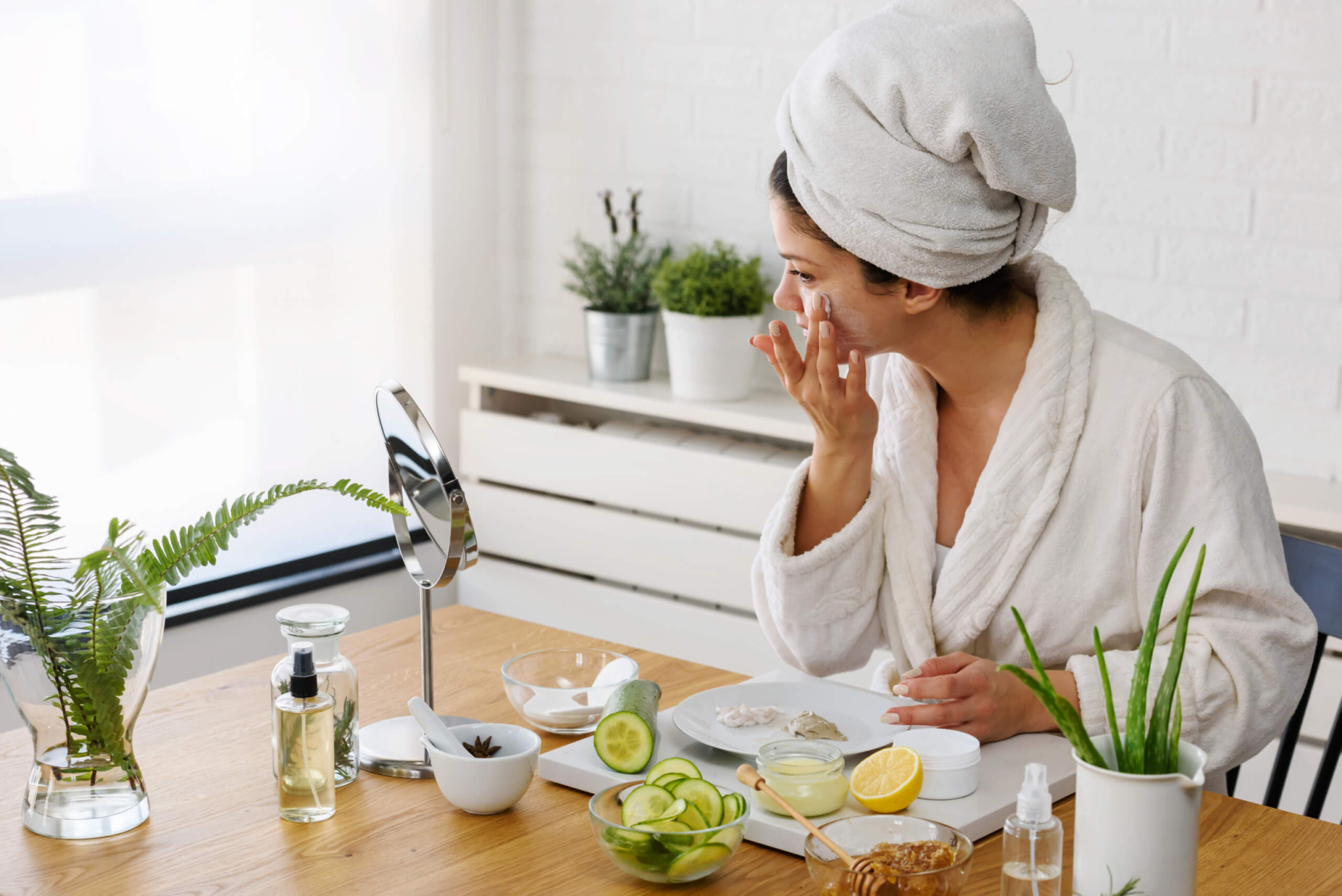
What Causes Acne?
For most of us, acne is no stranger. Up to 85% of young adults are affected by acne. And many of those continue to deal with acne issues well into adulthood.
The explanation for what causes acne makes it easy to understand why it’s so common. Simply put, acne is caused by oil and dead skin cells clogging up pores. This creates an ideal environment for the P. acnes bacteria to grow, causing redness and swelling. And when your body’s white blood cells attack the bacteria, you get inflammation and pimples.
But there are things you can do to treat existing acne and help prevent future outbreaks.
Dietary Changes to Reduce Acne
Though there is still a great deal of debate and controversy about how much diet affects acne, there are some that can help reduce the frequency and severity of acne outbreaks.
While more research is needed to more fully understand the relationships between diet and acne, it may be helpful to try to adjust your diet if acne is an issue for you.
Among the kinds of foods that it may be helpful to avoid are:
- Dairy products like milk, cheese, and yogurt
- Some studies have found that certain hormones in milk can increase acne, while others have found that acne sufferers drink more milk than those who don’t have acne.
- High glycemic load foods including white bread, soft drinks, cakes, doughnuts, candies, and sugary cereals
- These kinds of foods quickly raise your blood sugar, which causes a spike in insulin, which can increase the production of oil in your pores.
Fortunately, there are foods that seem to help reduce the risk of acne, as well, including:
- Low glycemic load foods like fruits, vegetables, legumes, nuts, and whole grains
- These foods help you avoid sugar spikes in your blood that ultimately trigger extra oil production in the pores.
- Green tea
- Green tea is high in antioxidants and polyphenols, which can help reduce inflammation and fight bacteria. It has also been shown to reduce blood sugar, like other low glycemic load foods.
- Garlic
- Garlic contains compounds that have anti-inflammatory and antibacterial qualities.
- Omega-3 foods like salmon, sardines, anchovies, walnuts, chia seeds, and ground flax seeds
- Omega-3 fatty acids can decrease inflammation and have been shown in some studies to reduce acne.
The good news here is that all the recommendations for dietary measures to combat acne are healthy options for your body for other reasons, as well. So even if you don’t see the results in the outbreaks that you hope for, you can still take heart that your diet is probably healthier than ever before.
Supplements for Acne Reduction
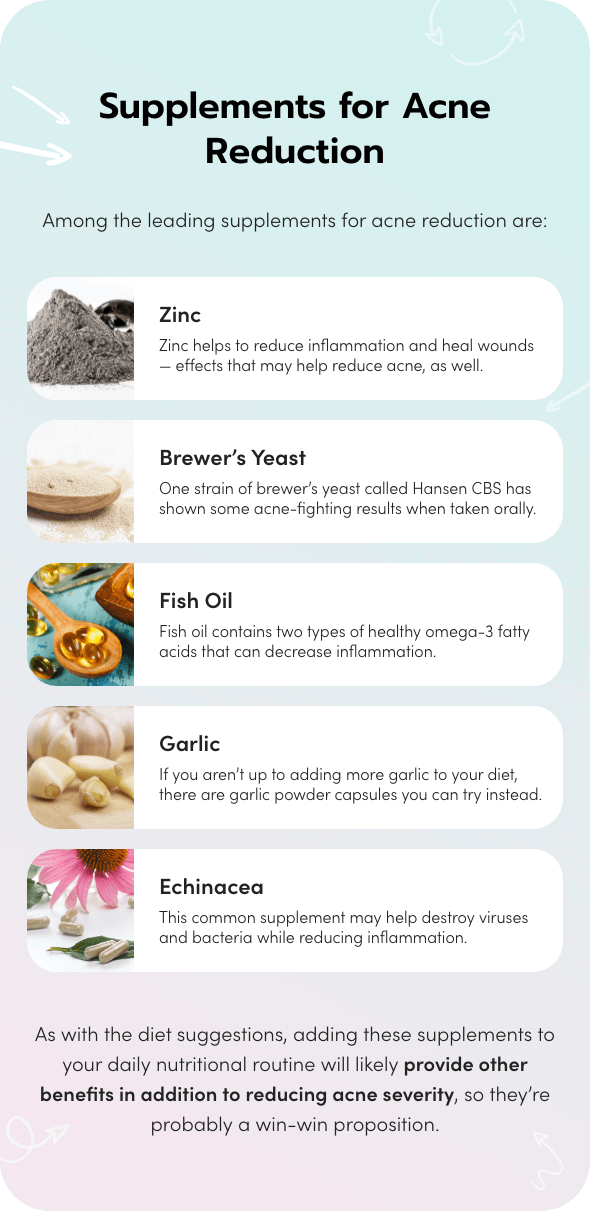
In addition to tweaking the foods you eat, there are several supplements you can add to your diet that may help reduce acne, as well. These are believed to have varying levels of anti-inflammatory, immune-boosting, and bacteria-fighting qualities. And while they are all-natural, it’s important to discuss with your doctor how these might help, and how they might interact with other medications you may be taking.
Among the leading supplements for acne reduction are:
- Zinc
- Zinc helps to reduce inflammation and heal wounds — effects that may help reduce acne, as well.
- Brewer’s Yeast
- One strain of brewer’s yeast called Hansen CBS has shown some acne-fighting results when taken orally. Just be careful, as it can also cause gas.
- Fish Oil
- Fish oil contains two types of healthy omega-3 fatty acids that can decrease inflammation, and have been shown in some studies to reduce acne.
- Garlic
- If you aren’t up to adding more garlic to your diet, or chomping on raw cloves, there are garlic powder capsules you can try instead.
- Echinacea
- This common supplement may help destroy viruses and bacteria while reducing inflammation.
As with the diet suggestions, adding these supplements to your daily nutritional routine will likely provide other benefits in addition to reducing acne severity, so they’re probably a win-win proposition.
Lifestyle Changes to Relieve Acne Issues
Besides diet and supplements, there are other lifestyle and behavior changes you can probably make to help reduce and relieve some acne issues.
They major lifestyle changes to reduce acne that we found include:
- Reduce stress
- The link between stress and acne isn’t fully understood, but
- Try reducing stress by getting more sleep, exercising, meditating, or just practicing deep breathing.
- Exercise regularly
- Exercise is good for just about everything, and the vast majority of us don’t get enough. So it’s no surprise that getting more can help reduce acne by increasing circulation, regulating hormones, and reducing stress and anxiety, among other things.
- Suggestion: Start with an extra 10 minutes a day, and work up from there.
- Don’t touch or pop pimples
- This one is really difficult, but touching (picking, scratching, or popping) pimples can help spread the bacteria that cause them around your face and body. Not to mention that popping zits doesn’t even get all the problem matter out, and often results in more redness, more swelling, and a delayed healing process. So a hands-off policy is best.
- Choose right cleanser
- Try to use cleansers that have a pH level of around 5.5, which is the natural pH of your skin. Higher pH levels can irritate skin and make acne worse.
- Oil-free skincare
- Acne is caused largely by your own natural oils clogging pores. Try not to add more oil to the mix with greasy or oil-based skincare products.
- If you can’t avoid oil-based makeup, try a multi-stage cleaning process to be sure to get rid of it all: use a makeup remover first, then wash your face.
- Hydrate
- Again, this is an essential tactic for a wide range of health reasons, and one most of us fall short on. But proper hydration reduces the risk of outbreaks and helps skin heal more quickly when they do happen.
- Recommended water intake varies per person, but most health experts recommend between six and eight 8-ounce glasses of water a day.
- And for skin specifically, you can add a moisturizer to your skincare routine to help add hydration (aloe vera moisturizers work great).
Obviously, some of these changes are harder than others. But you can’t really go wrong implementing them since they’re all good for you whether you’re dealing with persistent acne or not.
Spot Treatments
We’ve all been there. You’ve got a big date, a job interview, or a wedding to go to in a few days, so an opportunistic pimple takes the opportunity to torpedo your confidence.
And it doesn’t even have to be a big event to have a big effect on our self-image. Just heading to school or work with a protruding pimple can make you self-conscious.
That’s why it’s a great idea to keep some of these quick and easy at-home DIY acne remedies as spot treatments to zap that zit as soon as you feel it coming.
A few of the best spot treatments include:
- Tea Tree Oil
- This one came up in almost every resource we found. Tea tree oil reduces inflammation and fights acne-causing bacteria. It’s an active ingredient in many gels and creams (usually containing 5% tea tree oil), but you can also make your own solution.
- Just be careful: tea tree oil is potent, and it can be very irritating. Always dilute it with water or a carrier like olive, coconut, or grapeseed oil.
- For a homemade tea tree oil spot treatment, try mixing 1 tsp. of tea tree oil with 1 tsp. of carrier oil (OR mix 1 part tea tree oil with 9 parts water). Apply directly to pimples using a cotton swab 1 to 2 times a day.
- Green Tea
- This is another widely recognized acne remedy. While drinking green tea has its own health benefits, applying it directly to the skin can help fight inflammation and acne-causing bacteria.
- Products with 2% to 3% green tea extract can be effective spot treatments, but you can also make your own at home.
- For a homemade green tea spot treatment, steep your green tea in boiling water for 3 or 4 minutes, then let the tea cool. Once or twice a day, use a cotton ball to apply the tea to your whole face or spritz with a spray bottle. Leave it on for at least 10 minutes (you can leave it on overnight if you prefer). Then just rinse your face with water.
Lots of other essential oils, gels, and serums have at least anecdotal evidence indicating they help reduce inflammation, redness, and acne-causing bacteria when used as spot treatments. Just be sure to research the best ways to dilute and apply them, as some can be very irritating to your skin at high concentrations:
- Essential oils or extracts of cinnamon, rose, lavender, clove, rosemary, or lemongrass
- Gels containing acetic acid, orange, or sweet basil essential oils
- Witch hazel
- Apple cider vinegar
- Bovine cartilage creams
- Echinacea creams
- Purified bee venom gel
- Coconut oil
- Honey
DIY Facial Masks
If you need something more than spot treatment, you have a few options for full-face homemade acne treatments.
There is a whole range of acne-fighting facial masks you can create with ingredients you probably have right in your kitchen.
- Honey
- You may know that you can use honey as a natural cough syrup and for relieving sore throats. But honey can also be used to help heal burns and, with its antibacterial properties, can even help fight wound infections.
- You can apply these antibacterial properties to fight acne-causing bacteria, too.
- For a homemade honey mask, try one of these simple recipes:
- Straight honey: Rinse your face with warm water, apply honey for 30 minutes, then rinse it off with cool water.
- Honey and cinnamon: Mix 2 tbsp. honey with 1 tsp. cinnamon to make a paste. Wash face, apply mask for 10-15 minutes, then wash it off.
- Sea Salt
-
-
- Simply applying fine-grain salt to wet skin cleanses and removes dead skin cells from pores to help reduce acne during flare-ups.
- Just wet your face and gently pat sea salt on the skin (wet your hand, so the salt will stick). Leave it on for a few minutes, then rinse it off. Just don’t scrub, as straight salt is very abrasive.
-
-
Other common household ingredients can be combined to create additional homemade face masks. Some ingredients promise to destroy acne bacteria, reduce swelling, and alleviate redness. A quick Google search will surface mask recipes using ingredients as varied as:
- Baking soda
- Turmeric
- Cucumber
- Yeast and yogurt
- Oatmeal
- Jojoba oil
At-Home Scrubs & Exfoliants
Another way to address acne on a whole-face level is with a facial scrub. There are lots of commercial facial scrubs for skin issues and conditions, but you can create an at-home scrub to help cleanse the skin and reduce acne.
Sugar and salt come up again and again as great natural exfoliators. You’re bound to have one or the other in the cabinet, so the next step is finding the right medium to with it. Using the correct medium is important to make an effective homemade scrub.
- Sugar/Salt and Coconut Oil
- Sugar and salt come up again and again as great natural exfoliators. And since you’re bound to have one or the other in the cabinet.
- Coconut oil has anti-acne properties, making it an ideal medium to add exfoliants.</li>
- For a simple at-home scrub, mix ½ cup salt or sugar and ½ cup coconut oil. Rub it on your skin, then rinse well. If you want, you can an extra element of skin nourishment by adding ¼ cup of aloe vera to your scrub.</li>
Medical Treatments to Relieve Acne
There are a range of over-the-counter (OTC) medications you can buy to help address your acne if diet, lifestyle, and home remedies are ineffective.</p>
If you’re in the market for OTC acne solutions, look for products that contain the following active ingredients:
- Salicylic acid
- Hydrogen peroxide
- Alpha hydroxy acids
And though they are usually a last resort, there are several effective medical treatments available to address severe acne.
If you’ve tried home remedies and over-the-counter treatments without significant improvement, you may want to consult your doctor.
Doctors may prescribe stronger medication to treat your acne, including:
- Tretinoin gels and creams
- Clindamycin gels and creams
- Oral antibiotics
- Oral isotretinoin
- Birth control medications
Reduce Acne with Light Therapy
Don’t forget that blue light therapy is very effective at destroying acne-causing bacteria. The best blue light devices include red light therapy as well, helping reduce redness and inflammation from acne. It’s all-natural, drug-free, and easy to incorporate into your daily routine. And reVive Light Therapy™ acne devices require just 3 minutes of treatment per day, per treatment area to do their work.</p>
Plus, while significant results can be seen in just two weeks of daily treatments, you’ll likely start seeing noticeable results in just a few days. In fact, in a recent consumer study, 100% of participants saw significant reductions in acne, redness, and swelling when using reVive Light Therapy™ blue light therapy devices.</p>
Best of all, there are very few possible negative effects of blue light therapy treatment for acne. As mentioned, if you are taking Accutane for your acne, you should avoid using blue light therapy. And there are very rare instances of light-sensitivity that prevent users from using light therapy in general. But otherwise, light therapy is safe and easy to integrate into your daily acne-fighting routine.
Shop reVive Light Therapy™ acne-fighting devices here.
*If you or any other person has a medical concern, you should consult with your health care provider or seek other professional medical treatment immediately. Never disregard professional medical advice or delay in seeking it because of something that you have read on this blog, website or in any linked materials.</p>
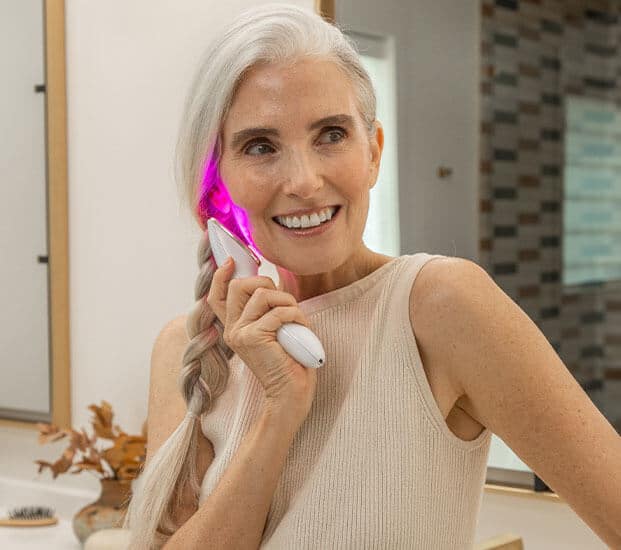
Experience the power of light therapy at home
Specific wavelengths of light have different effects, and can be used for a variety of applications — from destroying acne-causing bacteria to killing harmful germs on your phone. Our light therapy devices allow you to harness the power of LEDs in the comfort of your own home.
See How It Works